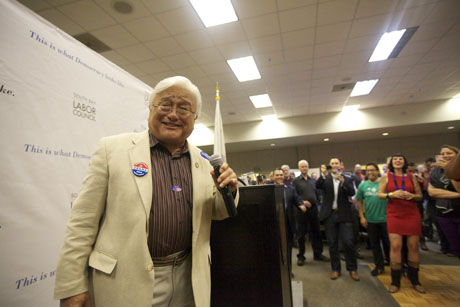Last week, President Obama addressed an audience at University of Central Missouri about rebuilding a vibrant middle class in America. The President enumerated several strategies that will become the cornerstones of the effort, including the most essential: “An education that prepares our children and our workers for the global competition they’ll face,” he said.
A second-to-none public education system that includes early childhood education for all is the foundation for this long-term strategy. We need to increase the percentage of Americans who can once again own a home, raise a healthy family and live full productive lives. In the speech, Obama said Washington has taken its eye off the ball relative to this essential outcome the last several years.
My faith in Washington coming to the aid of public education is waning. My column last week pointed to gridlock and the strange political alliances for the reauthorization of ESEA/NCLB. For this reason, we must focus on local issues while pushing for national reform.
I applaud Congressman Michael Honda’s recent convening of the STEM Advisory Council, which I attended last Friday at Applied Materials with 60-plus engineers, educators, policy makers and non-profit leaders.
Honda reviewed several STEM-related bills that have passed with his leadership since 2006 before turning over the microphone to keynote speaker Tom Kalil, deputy director for technology and innovation at the White House. Kalil emphasized the importance of STEM careers for today’s workforce.
We must act now, as more and more firms in the U.S., like Applied Materials, require science, technology, engineering or math degrees to satisfy their employment mandates. As noted by many attendees at the STEM advisory committee meeting, STEM careers produce middle-class jobs and low unemployment.
One participant noted that when he graduated from U.C. Berkeley in 1963 with a B.S. in engineering, the U.S. was producing 100,000 university graduates with engineering degrees. I was astounded to learn that today America is only producing 60,000 and the need is five times the current rate.
Some good news on the local front is the new San Jose patent office, in its temporary location in Menlo Park, is under the direction of Michelle Lee, a former Google employee who attended the advisory meeting. Lee noted that for innovation, intellectual property, and entrepreneurship to prosper in Silicon Valley, STEM education is critical. She added that she is very interested in partnering with local schools and districts to explore ways to invigorate the local STEM goals.
Dr. Mohammad Qayoumi, president of San Jose State University, also participated in Friday’s advisory meeting. He said that 55 percent of freshmen entering college in America require remedial courses in STEM fields, like math. Qayoumi asserted that STEM is basic survival and competency in these subjects is vital. He also boasted that SJSU graduates more engineering degree majors than all other local universities combined.
Many participants mentioned the importance of recruiting and preparing teachers. Dennis Cima, senior VP of the Silicon Valley Leadership Group, urged those assembled to advocate for quality early preschool experiences for all. No doubt, the attraction to STEM fields begins early in life, maybe even before kindergarten.
This first meeting convened by Congressman Honda is a good start for a local discussion on how we increase STEM graduates in record numbers, grow middle-class jobs and become another new iteration of the Valley of Hearts Delight. The newly elected mayor of San Jose in 2014 must also play a huge role.
If we do this right locally, we can continue to drive the world’s economy with a thriving middle-class for generations to come.
Joseph Di Salvo is a member of the Santa Clara County Office of Education’s Board of Trustees. He is a San Jose native.


Enjoy your final term in Congress, Mike.
Your faith is waning in Washington’s ability to help educate kids in San Jose? Good. It’s about time. It’s time to scale back your misguided ideas about centralization being a good idea. Don’t quit scaling back until you understand that the responsibility for any individual getting a good education lies solely with that individual and his/her parents. Their education is not Washington’s job, it’s not Sacramento’s job, it’s not the school district’s job, it’s not the school’s job, it’s not the teacher’s job. It’s the student’s job. Put the onus squarely on them. The opportunity is there for every child to get a solid education and it’s there right now. It’s not perfect but it’s unrealistic to expect that it ever could be. It’s their job to take advantage of it. Nobody elses. We’re giving them the opportunity and the rest is up to them.
As the great Yogi Berra might have said, “If kids don’t want to go to school, nobody’s gonna stop them.”